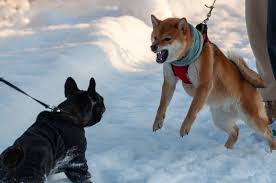
The title of this blog post might evoke a chuckle or two, but it aptly captures the essence of my musings. And no, I am not alluding to the cliché found in romantic comedies where initial disdain blossoms into love. I’m referring to the literal experience of ‘hate at first sight’ that is sustained over time. It’s a concept that’s long intrigued me, and even more so after witnessing several dogs on leashes ferociously trying to lunge at one another during walks. These encounters left me pondering: why are some dogs instinctively hostile while others remain indifferent? Then it hit me: this isn’t just a canine quirk. Some people display the same baseless animosity toward people they’ve just met. Have you ever encountered such instant, inexplicable hostility from someone?
So, out of curiosity and my undying love for dogs (haha), I decided to do some research on why they behaved that way. I stumbled upon an insightful blog that explained that aggression in dogs meeting other dogs for the first time is often rooted in fear and anxiety, as they feel the need to protect themselves. It’s quite interesting, isn’t it? They further clarified that this behaviour often occurs due to the restrictions imposed when they are leashed and unable to greet others naturally. This made me wonder if a similar explanation applies to humans who display impulsive hatred and aggression towards people they meet for the first time. Could there be unseen “leashes” restraining them, causing their hostility to stem from fear? I decided to do more research and it turns out there is a little bit of truth in that theory!
Upon further research, I found another interesting blog about why some people may dislike others seemingly for no reason. The writer made several valid points. I totally agree with the writer, although I didn’t check for scientific evidence to support their claims. First, people don’t just hate others for no reason; it often stems from the subconscious. They went ahead to list several reasons why someone might instantly dislike another person. For instance, it could simply be because they’re different, and this reason is so prevalent in my experience, coming from a multiethnic country and moving to Europe. People could also instantly hate you because they see you as a competitor for a perceived common interest. He gave the example of a hardworking coworker who may outcompete the other in the next promotion or a more attractive person who could become a crush’s interest. These are relatable scenarios. Other reasons the writer mentioned include being previously threatened by the person, or being reminded of something or someone threatening. The reason I found most intriguing is related to the previous ones but less obvious. One person may instantly hate another person because they remind them of their flaws or possess qualities they desire to have. For example, a messy person may instantly hate someone who is neatly dressed.
So, just like our canine distant relatives, a hostile attitude and aggressive behaviour towards people we barely know may stem from subconscious leashes of fears or insecurities. It could also be plain old jealousy. I don’t seem to have any concrete advice to end this blog post, but I guess it’s helpful to understand why we might instantly dislike a person, and self-reflection can be handy in disentangling why we may dislike a person for no apparent reason. And what if we find ourselves on the receiving end of this irrational hatred and hostility upon the first encounter? The key is to not take it personally. Now armed with an understanding of the plausible reasons that might lead someone to despise you at first sight, perhaps it is possible to approach them with empathy. Not taking things personally may be one of the most difficult things to learn, but mastering this skill will save you a lot of stress. This Ted talk can teach you how.




I can totally relate to this post
Once again you nailed this.
Thanks 🙂